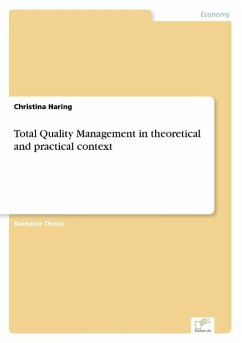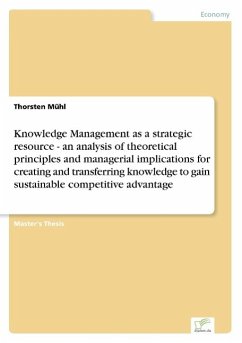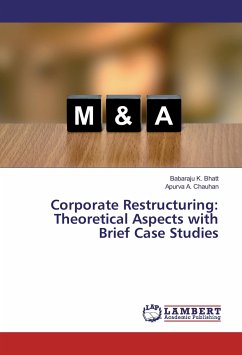Bachelor Thesis from the year 2002 in the subject Business economics - Business Management, Corporate Governance, grade: 1,0, Anglia Ruskin University (International Management), language: English, abstract: Inhaltsangabe:Abstract:
Thesis: To what extend is the implementation of Total Quality encouraged by the European Quality System and how is this theory put into action within a company specific context in order to meet the requirements?
The following study focuses on Total Quality Management. It begins with a short overview of the development of quality concepts within the last 50 years.
It deals in detail with the fundamental elements of TQM. The particular principles are arranged in a way, which illustrates the mutual supportive interrelationships. After that, the European quality system is explained. It is primarily focused on the European Quality Award and its belonging assessment criteria.
Within this framework, the Total Quality implementation is demonstrated by the example of a recent award winner. It is examined in which way and to what extend the theoretical principles of TQM have been applied in order to meet the European guidelines.
With reference to the theory, the European evaluation system as well as the company specific application is critically analysed.
Introduction:
Today s leading organisations are getting aware that it is important to develop a process of continuous improvement in order to deal with the worldwide increasing competition in a successful way. The adaptation to the incessant changing demands of the market and the customer is a problematic task for a company. Under these conditions, top-managers are looking for ways to break up old structures and to take future demands into consideration.
One particular approach to improved effectiveness of company performance is the Japanese inspired Total Quality Management (TQM). The fundamental thought is that quality cannot only be seen as a mechanistic process but has to be accepted as a company pervading system. It requires teamwork and an increased development and involvement of employees.
Companies, which strive after a high level of quality, see in the customer the key element. They realise that they have to offer the highest possible quality level of products and services. Total Quality Management provides various techniques, which secure the acceptance of this philosophy within the entire organisation and facilitate the necessary changes of behaviour and mentality.
Inhaltsverzeichnis:Table of Contents:
1.Introduction1
2.The Emerging and Development of Quality Concepts3
3.The Principles of Total Quality Management5
3.1Adaptation of a Quality Orientated Attitude6
3.2The Role of Management8
3.3Leadership Development10
3.4Management of People12
3.5Customer/Supplier Relationship14
3.6Customer Orientation15
3.7Supplier Integration16
3.8Preventive Action18
3.9Continuous Improvement20
3.10Lean Management22
3.11Benchmarking24
3.12Quality Controlling25
4.The European Quality Award27
5.Nokia Company Profile29
6.Nokia and the Excellence Model31
6.1Leadership33
6.2People37
6.3Policy and Strategy41
6.4Partnership and Resources44
6.5Processes48
6.6People Results52
6.7Customer Results54
6.8Society Results57
6.9Key Performance Results63
7.Conclusion65
8.BibliographyI
Hinweis: Dieser Artikel kann nur an eine deutsche Lieferadresse ausgeliefert werden.
Thesis: To what extend is the implementation of Total Quality encouraged by the European Quality System and how is this theory put into action within a company specific context in order to meet the requirements?
The following study focuses on Total Quality Management. It begins with a short overview of the development of quality concepts within the last 50 years.
It deals in detail with the fundamental elements of TQM. The particular principles are arranged in a way, which illustrates the mutual supportive interrelationships. After that, the European quality system is explained. It is primarily focused on the European Quality Award and its belonging assessment criteria.
Within this framework, the Total Quality implementation is demonstrated by the example of a recent award winner. It is examined in which way and to what extend the theoretical principles of TQM have been applied in order to meet the European guidelines.
With reference to the theory, the European evaluation system as well as the company specific application is critically analysed.
Introduction:
Today s leading organisations are getting aware that it is important to develop a process of continuous improvement in order to deal with the worldwide increasing competition in a successful way. The adaptation to the incessant changing demands of the market and the customer is a problematic task for a company. Under these conditions, top-managers are looking for ways to break up old structures and to take future demands into consideration.
One particular approach to improved effectiveness of company performance is the Japanese inspired Total Quality Management (TQM). The fundamental thought is that quality cannot only be seen as a mechanistic process but has to be accepted as a company pervading system. It requires teamwork and an increased development and involvement of employees.
Companies, which strive after a high level of quality, see in the customer the key element. They realise that they have to offer the highest possible quality level of products and services. Total Quality Management provides various techniques, which secure the acceptance of this philosophy within the entire organisation and facilitate the necessary changes of behaviour and mentality.
Inhaltsverzeichnis:Table of Contents:
1.Introduction1
2.The Emerging and Development of Quality Concepts3
3.The Principles of Total Quality Management5
3.1Adaptation of a Quality Orientated Attitude6
3.2The Role of Management8
3.3Leadership Development10
3.4Management of People12
3.5Customer/Supplier Relationship14
3.6Customer Orientation15
3.7Supplier Integration16
3.8Preventive Action18
3.9Continuous Improvement20
3.10Lean Management22
3.11Benchmarking24
3.12Quality Controlling25
4.The European Quality Award27
5.Nokia Company Profile29
6.Nokia and the Excellence Model31
6.1Leadership33
6.2People37
6.3Policy and Strategy41
6.4Partnership and Resources44
6.5Processes48
6.6People Results52
6.7Customer Results54
6.8Society Results57
6.9Key Performance Results63
7.Conclusion65
8.BibliographyI
Hinweis: Dieser Artikel kann nur an eine deutsche Lieferadresse ausgeliefert werden.








